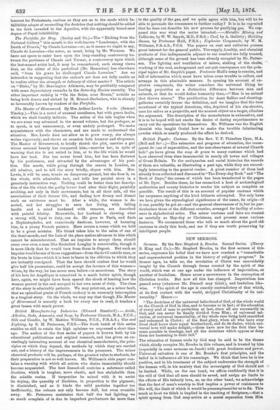The Master of Riverswood. By Mrs. Arthur Lewis. 3 vols.
(Samuel Tinsley.)—This is a novel of unusual excellence, but with grave faults, which we shall frankly indicate. The action of the tale begins when we are some way advanced in the second volume, but the prologue, so to speak, is not unnecessary, or even unduly prolonged. We make acquaintance with the characters, and are made to understand the situation. Mrs. Lewis does not allow us to grow weary, she always writes vigorously, and shows on occasion both humour and eloquence. The Master of Riverswood, to briefly sketch the plot, marries a girl whose unusual beauty has conquered him,—marries her, in spite of warning that she is not suited to him, or to the life which he would have her load. She has never loved him, but has been flattered by his preference, and attracted by the advantages of his posi- tion. She meets, while going through the season in London, an old admirer, and to tall the story briefly, elopes with him. Mrs. Lewis, it will be seen, treads on dangerous ground, but she does it, on the whole, with admirable tact, and tells her painful story in a genuinely instructive way. Nothing could be better than her descrip- tion of the life which the guilty lovers load after their flight, painfully avoiding, not only in their movements, but in all their talk, all the associations of their former life, and finding how dreary and dismal such an existence must be. After a while, the woman is de- serted, and her struggles to earn her living, with failing health and a mind burdened with remorse, are described with painful fidelity. Meanwhile, her husband is showing what a strong will, loyal to duty, can do. He goes to Paris, and finds a Mephistopheles, not consciously desirous, however, of harming him, in a young French painter. Here occurs a scene which we hold to be a great mistake. His friend takes him to the salon of one of the demi-monde, and the Leis of the place makes advances to him which cannot be misunderstood. That an impulse to accept them should come over even a man like Rochefort Longley is conceivable, though it is more likely that he would turn from them in disgust. But such an impulse would be one of those suggestions—from the devil outside man, or the brute in him—which it is best to leave in the oblivion to which they are instantly consigned. That the hero should confess that be would give half his possessions, could he accept the favours of this woman— whom, by the way, he has never seen before—is monstrous. The story of his love for AngSlique is conceived in a much better spirit, though hero, again, we might have been spared the shock of hearing how the woman proved in the end unequal to her own sense of duty. The close of the story is admirably pathetic. We may point out, as a minor fault, that an episodical praise of French cookery is an unseemly interruption to a tragical story. On the whole, we may say that though The Master of Riverswood is scarcely a book for every one to read, it teaches a great lesson with much power.


































 Previous page
Previous page